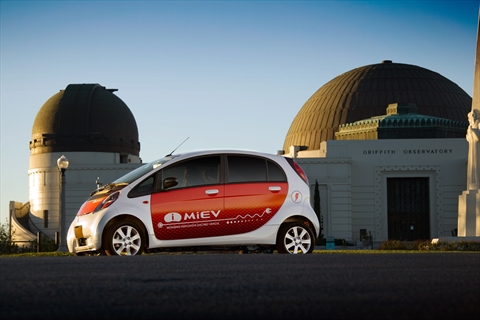Will going electric ever make automotive sense?
By John LeBlanc
We’re hearing — and seeing — a lot this year about the electrification of the car. And not just from boutique, low volume companies like California’s Tesla, which has only sold about 1,000 copies of its $125,000 Roadster since going on sale two years ago. Huge, mainstream global automakers like Toyota, Mitsubishi, Mercedes-Benz and General Motors have all been showing off examples of production (or soon-to-be-produced) vehicles powered exclusively by electricity.
Of course, the dream of “zero-emissions” driving is what’s fueling the Electric Vehicle optimism. The public — and subsequently, publicly-elected governments — are seeking ways to limit the burning of fossil fuels for various reasons, from national security policies to an attempt to slowdown the warming of our planet. Plus, driving an EV can be a lot of fun. Production EVs that I’ve had the opportunity to drive briefly, like the Mitsubishi i-MiEV city car (above) and Mini E, are inherently smooth, quiet and powerful. In fact, from 0-to-80 km/h in the i-MiEV is 1.5 seconds quicker than the gas model, at around 10 seconds.
It’s these types of qualities that have mainstream automakers optimistic EVs can someday replace the gas-guzzling dinosaur in your laneway. “In 10 years, 12 years, you are going to see a major portion of our portfolio move to electric vehicles,” Ford’s CEO, Alan Mulally, told the Wall Street Journal. Nissan-Renault’s CEO, Carlos Ghosn, has been more specific, predicting 10 per cent of the global new car market will be electric cars by 2020. The automaker is planning to build 500,000 electric cars per year, starting with its Leaf EV next year.
However, the massive investment from automakers — and governments that are subsidizing EV development and consumer purchases — comes with considerable risk. In their current state, EVs are costly to buy, have relatively short driving ranges, and when they do need to recharge, or “fill-up”, facilities are severely limited or non-existent. Zero-emissions driving won’t come for free, either. In Japan, the i-MiEV sells for about 3 million yen, or about $36,000 (twice the price of a gas-only model.) But that’s only because of a government subsidy for “green” automobiles, similar to the $10,000 rebate the Ontario government will start offering this July on EVs like the Chevrolet Volt plug-in electric.
The other EV limitation is driving range. A round trip jaunt to the Muskokas for the weekend will be challenging in your EV. Most production EVs can travel approximately 160 kms on a full charge, but only in “ideal” conditions. The EVs I’ve driven usually perform at half that rate. The question, “Where do I plug-in my EV?” may be the most challenging answer on the road to making EVs a viable alternative. Automakers can make the cars, but governments need to make charging stations available to close the circle. In the end, EV owners may end up having to own a second “real” (i.e. gas) car, taking twice the resources in manufacturing and another expensive urban parking space. That doesn’t sound very “green,” does it?
Can EVs overcome their inherent inconveniences to win over customers? Will they ever be a real alternative to “normal” fossil fuel-powered vehicles? Nissan-Renault’s Ghosn is counting on it. He says an EV makes sense for the “80 per cent of the people on earth, driving a car, (who) drive less than 100 km a day.
“Let’s not forget this is a technology which is starting, is going to mature, is going to get better and the range is going to go up.”
Comments
3 Responses to “Will going electric ever make automotive sense?”






![[del.icio.us]](https://www.straight-six.com/wp-content/plugins/bookmarkify/delicious.png)
![[Digg]](https://www.straight-six.com/wp-content/plugins/bookmarkify/digg.png)
![[Facebook]](https://www.straight-six.com/wp-content/plugins/bookmarkify/facebook.png)
![[Google]](https://www.straight-six.com/wp-content/plugins/bookmarkify/google.png)
![[Reddit]](https://www.straight-six.com/wp-content/plugins/bookmarkify/reddit.png)
![[StumbleUpon]](https://www.straight-six.com/wp-content/plugins/bookmarkify/stumbleupon.png)
![[Twitter]](https://www.straight-six.com/wp-content/plugins/bookmarkify/twitter.png)
![[Email]](https://www.straight-six.com/wp-content/plugins/bookmarkify/email.png)
April 3rd, 2010 @ 7:15 pm
ПОЛНАЯ !!!…
Huge, mainstream global automakers like Toyota, Mitsubishi, Mercedes-Benz […….
April 15th, 2010 @ 7:33 pm
Telepath…
Интернет пишется с большой буквы внутри предложения, если что. И сотые не с точкой, а с запятой. Это по стандарту. А так неплохо все, просто вэри гуд! http://woman911.ru/ ….
April 21st, 2010 @ 2:44 pm
Teleroad…
В прошлом годы был на Ибице, так там познакомился с человеком, у которого стиль изложения материала очень похож на ваш. Но, к сожалению, тот человек очень далек от Интернета. http://questiontourism.ru/ ….